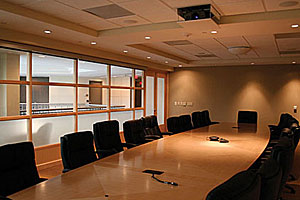
|
I have been involved with numerous CEOs and presidents in a variety of capacities from being a personal executive coach to sitting on the board of directors to being a consultant on specific leadership and sales projects.
In fact, I have walked in those executive shoes myself. One thing I have learned is every decision a CEO makes has a consequence. Sometimes that consequence is direct and recognizable, and sometimes it is not and could be considered — to utilize a military term — collateral damage.
Most CEOs and presidents of corporations are dedicated, hard-working and committed individuals. However, in spite of that round of praise, CEOs too have their weak spots. That weak spot often is recognizable in dealing with problem employees that exist within the confines of upper management. This especially is true of privately held businesses and predominant in family-run businesses because compassion for people is viewed as a core value of most private/family-run businesses.
I personally have witnessed a number of circumstances that demonstrate the difficult challenges a CEO faces when addressing issues related to upper-management accountability or even family-related accountability in the workplace.
Incompetent Charlie
Charlie is the brother of the CEO’s wife. Charlie is less than an average employee and often wears his relationship to the CEO on his sleeve. Other employees feel Charlie gets away with too much, is overpaid and doesn’t carry his load. He expects other employees to pick up the pieces he may drop along the way. The CEO agonizes over this and makes the choice that doing nothing is the right move so he doesn’t upset relationships with his wife and other relatives.
Choices have consequences. If the CEO took the time to figure out what the cost of his decision was to the business, he probably would be amazed at the negative impact his choice has on company growth, profitability, leadership development, as well as recruitment and retention.
Abe the autocratic manager
Nobody really likes Abe, but nobody openly challenges him either. Abe is a bully. Twenty years ago Abe saved the CEO’s daughter from drowning at a swimming pool and from that day forward Abe has been a hero in the CEO’s mind. Abe is not incompetent. He typically performs his job in a satisfactory fashion, but is very territorial and has little respect for management. Over the years he has learned how to work the CEO and takes advantage of his relationship. At any other company Abe would have been booted out simply based on his attitude and his treatment and disrespect of employees and ownership. The CEO’s choice in this case is often to stand back and hope the problem goes away or keep it from surfacing at the executive level.
But choices have consequences when a manager at a high level in an organization becomes very territorial and leverages his or her ability to dominate and control. The consequence often is the inability to determine exactly what their motives are and at what cost it will have to the organization.
Remember, culture is the foundation for success in any organization and allowing employees, regardless of rank or tenure, to demonstrate this kind of behavior sends the wrong message to all employees. In fact, it becomes a cancer that can destroy the kind of culture built on core company values. Employees lose respect for their leaders. How much is that worth?
Sisterhood of shiftiness
Sarah, Shelly and Sally are sisters of the president and have a minority interest in the company. All three have executive management titles due to their family ties. All three do a good job at what they are assigned to do. However, at least one of the sisters (Sally) feels compelled to let it be known she is an owner and deserves every perk and benefit given to the president.
Although Sarah and Shelly are hard workers (albeit well-overpaid), Sally is the shifty one with a big ego. To further complicate matters, the president’s wife is company CFO. The CEO is disheartened by the sisters all sticking up for each other, but doesn’t feel compelled to address it. Sally (who has the wife’s ear) informally goes around telling other managers how they should be doing their job. Since the CEO is now in his mid-60s and Sally is only 42, she tells people (saying it is confidential) that she is slated to become the next company president.
The president has addressed some of his concerns with Sally and Sally has skillfully disguised her behavior a little better, but since no consequence has been administered to Sally the problem simply stays dormant, waiting for the right time to reemerge. The president made a choice not to go any further even though he felt he drew a red line in the sand.
Again, choices have consequences. What impact does the situation have on the company? What impact do these choices have on the company’s core values and culture?
Sam the unscrupulous salesman
Sam is a well-seasoned and long-tenured salesman. He has the largest book of business in the company. Although he holds the title of sales manager, he functions predominantly as a territory salesperson and delegates his sales-management responsibilities to his buddy and direct report. Sam knows he is the biggest contributor to the top line of the company and never passes the opportunity to let everyone know about it. He always is late for meetings, often ignores requests from the VP of sales on reports, religiously pads his expense accounts, and often is found out of his territory doing personal business in spite of an itinerary that says he is in front of customers.
Sam has violated the company’s core values on numerous occasions. The VP of sales is quite fed up and wants to dismiss Sam. The CEO made the choice not to terminate and told the VP of sales to rein him in a little but not to push it too much for fear of losing a substantial amount of business.
But choices have consequences. What does it say about the future of the organization if we acquiesce and let the “inmates run the asylum?” How can we address any issue with any employee if we demonstrate our inability to hold people accountable? In this instance, I can tell you the consequence of this CEO’s choice will impact the attitude and performance of the entire company.
The choices we make
CEOs and presidents often make poor choices because they fear direct conflict. They convince themselves to stay above the fray and let situations work themselves out. Many times, CEOs find their choices can be controlled by emotions without consideration of consequences.
You can choose to continue to live with the situation and give it lip service, but the situation will continue to destroy relationships, morale and even culture. The consequence becomes more frustration, anger, employee resentment, time wasted, profits lost and eventually could evolve into a culture of corruption.
If you make choices based on fear, anger, misguided dedication, hurt, revenge, jealousy, and personal family awareness instead of what is best for the business, your choices will eventually come back to bite you and create more future challenge than you can imagine.
What’s the answer?
It starts with recognizing the need to set boundaries starting with exactly what you are and what you are not willing to tolerate based on the company’s core values and what is in the best interest of the company and all its employees. Put business needs ahead of personal needs.
View every relationship you have with honesty, integrity and face the reality of your circumstances. Determine the real consequences of your past choices and don’t sugarcoat them. Look at every area of your business life. You can create a more successful business by making the right choices. You also can put your business on the path of a death spiral with the wrong choices.
You can make better choices if you break the chains of personal emotions, outside influence and fear of conflict. View situations as they really are. It is impossible to avoid the choice-consequence factor. It is a law of the universe.
Remember, choices have consequences.




